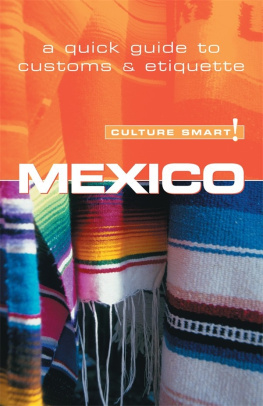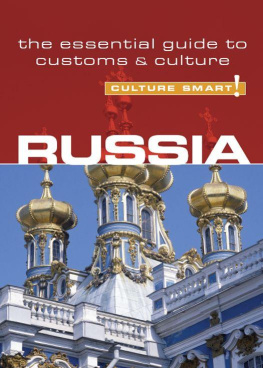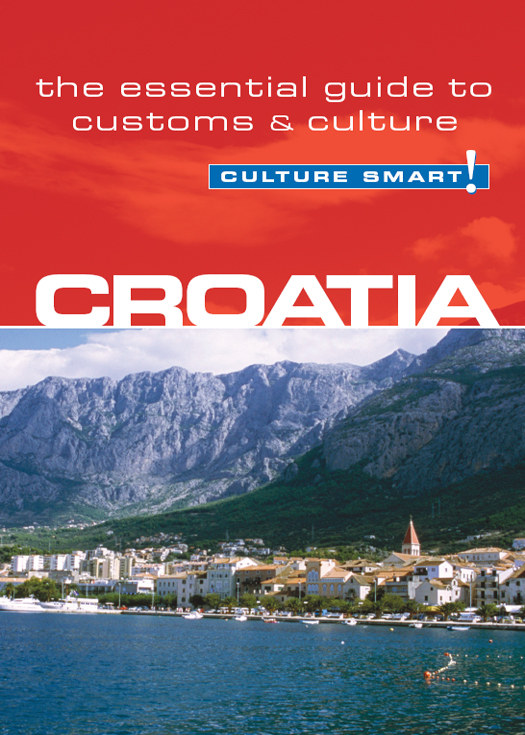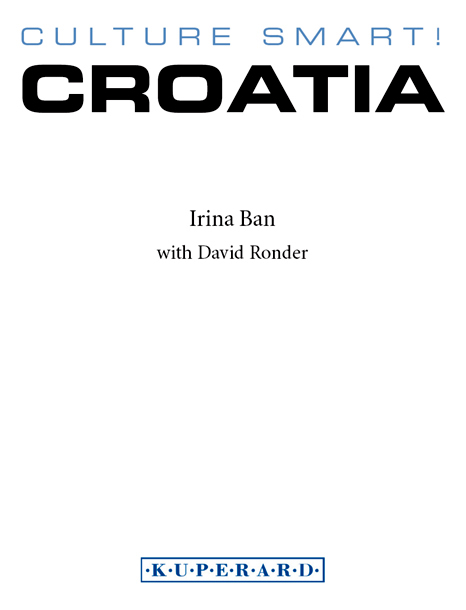eISBN: 978-1-85733-613-9
British Library Cataloguing in Publication Data
A CIP catalogue entry for this book is available from the British Library
Copyright 2008 Kuperard
All rights reserved. No part of this publication may be reprinted or reproduced, stored in a retrieval system, or transmitted in any form or by any means without prior permission in writing from the publishers.
Culture Smart! is a registered trademark of Bravo Ltd
First published in Great Britain 2008
by Kuperard, an imprint of Bravo Ltd
59 Hutton Grove, London N12 8DS
Tel: +44 (0) 20 8446 2440 Fax: +44 (0) 20 8446 2441
www.culturesmart.co.uk
Inquiries:
Series Editor Geoffrey Chesler
Cover image: Makarska, on the Dalmatian coast.
Travel Ink/Robin McKelvie
Images courtesy of the Croatian National Tourist Board.
Images Markus Bernet
v3.1
About the Author
IRINA BAN is a PR agent and consultant specializing in Croatias hidden destinations, gastronomy, and wines. She has organized trips for journalists and photographers from such diverse publications as GEO, National Geographic, National Geographic Adventurer, Elle, Le Figaro Magazine, The Financial Times, The Guardian, CondeNast Traveller, The Independent, World Atlas of Wines, and Scotland on Sunday. She has contributed to Time Out Visitors Guide to Croatia, Alistair Sawdays Special Places to Stay in Croatia, and the French travel guides Petit Fut and Hbergement Insolite. Beside travel and tourism, she is interested in cross-cultural projects. In 2004, together with the Croatian Embassy in Brussels, she helped to organize the photographic exhibition Croatian Lighthouses in the Berlaymont building, the first such event to be held by the European Executive. She lives and works in Zagreb.
The Culture Smart! series is continuing to expand.
For further information and latest titles visit
www.culturesmartguides.com
The publishers would like to thank CultureSmart!Consulting for its help in researching and developing the concept for this series.
CultureSmart!Consulting creates tailor-made seminars and consultancy programs to meet a wide range of corporate, public-sector, and individual needs. Whether delivering courses on multicultural team building in the USA, preparing Chinese engineers for a posting in Europe, training call-center staff in India, or raising the awareness of police forces to the needs of diverse ethnic communities, it provides essential, practical, and powerful skills worldwide to an increasingly international workforce.
For details, visit www.culturesmartconsulting.com
CultureSmart!Consulting and CultureSmart! guides have both contributed to and featured regularly in the weekly travel program Fast Track on BBC World TV.
contents
Map of Croatia
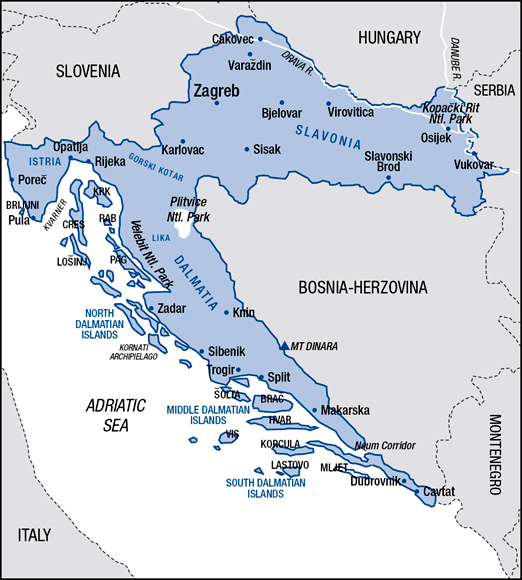
introduction
Croatia is described as the land of a thousand islands and a small country for a great holiday. Most people still remember it as a part of Yugoslavia, and as a country that went to war for independence. Some may have heard only of the medieval town of Dubrovnik, the pearl of the Adriatic and one of six UNESCO sites in Croatia. Others may know that it is short-listed to enter the European Union around 2010, or that it is among the worlds top ten tourist destinations.
In this small and beautiful country, sea and mountains are within easy reach, and there is a great diversity of landscape, mentality, and life styles. Its rich and turbulent history can be traced back to ancient times, to long before the Greeks and Romans founded their great colonies on the Croatian islands of Hvar and Vis.
Culture Smart! Croatia is designed to give you an insight into Croatian values and the Croatian ways of life and work. It looks at how the past has molded the national psyche. A short introduction to Croatian history and language will help you to understand how and why the Croats fought for independence from Yugoslavia, and why this part of the Balkan Peninsula is still one of the most complicated regions in Europe. It will tell you who the Croats are, what are they like, what they respect, how they live and behave, and how you should behave when visiting their country. It will guide you through their customs, quirks, and etiquette, and offer tips on doing business, communicating, and feeling comfortable with the local people. The Croatian temperament is a mix of Slavic openness and Mediterranean ease, but the people are, not surprisingly, sensitive when it comes to matters of national pride and their state.
Your first impressions may surprise you: youll notice how cheerful and noisy the Croats are, how they use hands and gestures and touch when they are talking, and their straightforward approach. You will observe that the people tend to be tall and well built, and pay a lot of attention to clothes and appearance, and you may have occasion to remark on the large number of smart cars on the roads in a country where unemployment is running at around 12 percent. Visiting businesspeople are frequently frustrated by the huge amount of paperwork needed to start up a project or get things done, and by lengthy administrative processes. There is one impression, however, that is common to all visitors: that of Croatian warmth and hospitality.
Culture Smart! Croatia offers the first-time visitor vital human information, from backgound briefings to practical advice on what to expect and how to behave in different situations. By explaining the cultural context behind the dos and donts, however, it aims to empower you to discover for yourself the charm, generosity, and humanity of the Croatian people.
Key Facts
| Official Name | Republic of Croatia (Republika Hrvatska) | In 1991 Croatia attained independence from Yugoslavia. |
| Capital City | Zagreb | Pop. 779,145 (official est. 2006); incl. suburbs, around 1 million |
| Other Major Cities | Split, Rijeka, Osijek, Zadar, Pula, Varadin, Slavonski Brod, ibenik, Dubrovnik |
| Area | 33.826 sq.miles (87.609 sq.km) | Land area, 21.830 sq.miles (56.542 sq.km). Sea area, 11.995 sq.miles (31.067 sq.km). Number of Islands 1.185 (47 inhabited) |
| Borders | Slovenia, Hungary, Serbia, Montenegro, Bosnia & Herzegovina; sea border with Italy |
| Climate | Continental inland and Mediterranean along the coastline and on the islands |
| Currency | Croatian kuna (kn) |
| Population | 4.437.460 (official est. 2006) | Birthrate is among the lowest in Europe |
| Ethnic Make-up | Croats 89.66%, Serbs 4.5%. Other minorities and nationalities 5.84% |
| Language | Croatian | Slavic Language, Latin script |
| Religion | No official state religion. More than 87% of the pop. are Roman Catholic, 4.4% Serbian Orthodox Christian, 1.3% Muslim, less than 1% Jewish, 4% other, 2% atheist |


